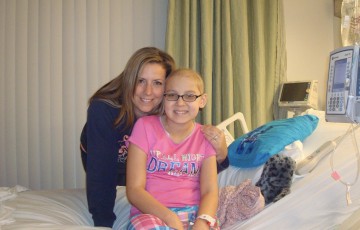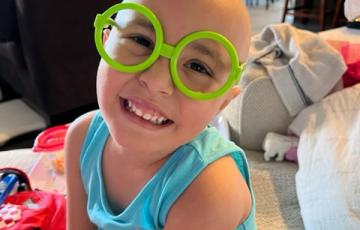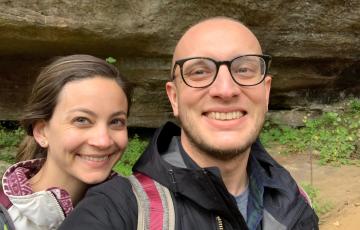Search Results

Doug
I have always been a builder. Professionally, I am an architect. You could say that I’ve spent my life building spaces where people could grow. I never imagined, however, that I would someday have to rebuild my own. In February 2015, after experiencing months of excruciating and debilitating back pain that doctors mistakenly attributed to deteriorating lower lumbar discs, I had an MRI that revealed multiple vertebral compressed fractures.

Christopher
In January 2013, I was diagnosed with PH+ acute lymphoblastic leukemia (ALL). I had just turned 19 and finished my first semester at the University of Florida. I missed the rest of my freshman year but after eight months in and out of the hospital, I achieved remission and my doctors allowed me to go back to school for the fall.

Taylor
In February of 2019, I was diagnosed with stage 4 Hodgkin lymphoma (HL). What started with a simple cough quickly turned into the most challenging year of my life. When you hear the words “you have cancer,” the world stops spinning. There is no way to prepare for the cold, dark fear that takes over when there are so many unknowns. At this point, I didn't even know what lymphoma was. I was so lucky to have UCLA fighting with me and the incredible support of my entire family by my side. I owe it to all of them for pulling me through.

Elizabeth
On November 8, 2021, I was diagnosed with stage III multiple myeloma (MM), an incurable cancer. Prior to being diagnosed, I thought I was a healthy young woman and was just living life with my children. I would have different pains throughout my body, but I didn't think much about it and would ignore them for the most part. The pains throughout my body were getting more and more frequent, so I went to the ER in October 2021 because I was in pain and could not eat, they said I was possibly having acid reflux and gave me a prescription for nausea.

Rebecca
My mother died of multiple myeloma (MM) in 2001, 10 months after her diagnosis. She lived in a small town where the only treatment they offered her was chemo infusions. She was on dialysis the whole time. She was brave but scared, nonetheless. She didn't have much time to process the whole experience. I was 51 at the time and still believed I was bullet-proof! Silly girl!

Amy
I was diagnosed with acute myeloid leukemia (AML) when I was 43 years old and at the height of my career as an RN. I took care of critically ill patients but did not realize when I was critically ill myself. My diagnosis came after days of having hip pain which became progressively worse until I was unable to walk without assistance. My husband and son took me to the emergency room for testing. The doctor sat on my bed to discuss the results, and at that point, I knew things must be bad, but I did not expect her to say I may have cancer.
Suesan
During caregiving for my partner, Dil, cancer has acted as a proctor of lessons we would have rather gone without. I have become more aware of accessibility issues because the chemotherapy and radiation treatment combined with overwhelming doses of steroids led to him having spinal fractures which impeded his mobility. Now when we go to a movie, are traveling, or generally getting around, I come armed with a pillow for his chair, he with his cane, an eye trained for impassable curbs or spaces that he can't comfortably navigate.

Kendra
When I was 10, I had just moved to a new city and was acclimating to my new life when I suddenly started experiencing headaches. They were dull and not especially painful, but they were constant and quickly became a daily experience. I loved my new school and my new friends, and I became so active in my community with sports and clubs that it was concerning to my parents when I began missing school and other events. Over the course of several months, I was in and out of urgent care where I was diagnosed with migraines and told that I should stop missing school.

Janiyah
Our beautiful Janiyah was diagnosed with acute lymphoblastic leukemia (ALL) at 14 months old. Some will say by chance or luck, others say by the grace of God. Thirteen months earlier, Janiyah was diagnosed with hemoglobin C disease; simply defined as chronic anemia.

Gregg
The date was May 15, 2015, in the local office of the hematologist/oncologist and I was given this message after the results of my bone marrow biopsy taken a week earlier.

Juliana
Juliana is a vibrant, sweet, intelligent, and brave daughter to Judith and Jorge. She was born on May 24, 2017, in Houston, Texas. On December 30, 2021, Juliana was diagnosed with leukemia. On January 2, 2022, after three and a half days in the hospital and one full day in the ICU, her diagnosis was confirmed as B-cell acute lymphoblastic leukemia (ALL).
Diagnosis
While certain signs and symptoms may indicate that a person has MF, a series of tests are needed to confirm the diagnosis. It is important to have an accurate diagnosis, as it helps the doctor to:
- Estimate how the disease will progress
- Determine the appropriate treatment
Some of these tests may be repeated both during and after treatment to evaluate the effectiveness of treatment.
Relapsed and Refractory
Refractory non-Hodgkin lymphoma (NHL) is NHL that has not responded to initial treatment. Refractory disease may be disease that is getting worse or staying the same.
Relapsed non-Hodgkin lymphoma (NHL) is NHL that responded to treatment but then returns.
Treatment
Treatment for Hodgkin lymphoma is changing due to new drugs and research findings from clinical trials. Therefore, before treatment begins, it is important to consider getting a second opinion at a center with a Hodgkin lymphoma expert.
It's important that your doctor is experienced in treating patients with Hodgkin lymphoma or works in consultation with a Hodgkin lymphoma specialist. This type of specialist is called a hematologist-oncologist.
Physical Effects
Chemotherapy and Other Drug TherapiesChildren treated with chemotherapy, drug therapy or other therapies may be at increased risk for the following side effects. Click here to read more about these side effects.
Getting a Second Opinion
Leukemia, lymphoma, myeloma and myelodysplastic syndromes are each different types of cancers. What's more, each disease has subtypes. This means that the signs of the disease, how it's diagnosed and treated and the expected outcomes vary. That's why it's essential to have the right diagnosis before you begin or continue with treatment.
Managing Sexual Side Effects
An important part of managing side effects that impact your sexual health is to determine what factors may be causing or contributing to the changes you are experiencing, so that you can address them. Sexual side effects during cancer treatment can include:
Supportive Care
Supportive care is given to improve the quality of life for patients with MF. The goal of supportive care is to prevent or treat the symptoms of MF.
AnemiaAnemia is observed in more than 50 percent of patients with MF at the time of diagnosis. Before considering treatment options, it is important for doctors to rule out and treat the most common causes of anemia such as bleeding, iron deficiency, vitamin B12 deficiency and folic acid deficiency.
Treatment
Landon
My cancer journey began on June 24, 2018. A month before that day, I'd experienced chest pains, night sweats, and shortness of breath. After scheduling a doctor's appointment, my primary physician determined that it was merely an upper respiratory infection. For a week, I took the medicine prescribed by my doctor, hoping that I would soon feel well again. With little to no signs of improvement, I scheduled another appointment for Monday, June 25th. We didn't make it to that appointment, because on June 24th, I lost oxygen and passed out.

Allison
During the start of the pandemic, my boyfriend began working out from home with all the gyms being closed. While working out, he discovered a lump under his arm. We both waved it off as nothing to worry about, but he still asked his doctor about it just in case. His doctor wanted him to get it biopsied. I dropped him off for surgery, still naive that anything would actually be wrong. He wasn't showing symptoms, he was active and healthy, plus he was young. “We” were young. We were in love, talking about getting engaged, and just moved in together. What could go wrong?
Elissa
Ten years ago, my mother-in-law was diagnosed with stage 4 non-Hodgkin lymphoma (NHL). She has since been deemed cured and has had no recurrence since her successful treatment. Some of her medicines were funded by The Leukemia & Lymphoma Society (LLS). We spent years racing for Team In Training (TNT) to fundraise for LLS.
Art
I was living in San Jose and had gone walking with a friend in a local park that followed the stream. It was December 15, 2006. Tom noticed that I had difficulty climbing up the five-foot stream embankment that the path went through. I myself didn’t recall this. Ten days later while visiting my wife’s children in Fairfax, the children and I went on a trail as we always did on Christmas morning. I found myself badly winded and returned to their home while they continued the hike. Then I noticed that I was not attracted to the Christmas feast.

Gabby
Her name is Gabriella Sarai. We call her Gabby! She is a feisty little four year old. She has been running circles around her two older brothers, her dad, and me since she was able to walk. She is the baby and the only girl. She gets away with a lot.